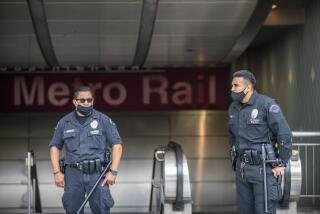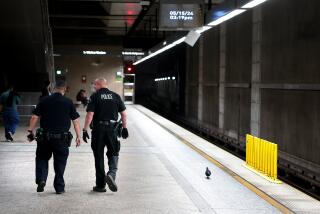Mexico City’s Traffic Cops Find Themselves Ticketless
- Share via
MEXICO CITY — Imagine a corruption problem so serious that you don’t trust your traffic cops to give out tickets.
Mexico City Police Chief Alejandro Gertz faced a public outcry over exactly that dilemma. So on Monday, he took away the citation books from the city’s 900 traffic officers.
Instead, Gertz authorized just 30 police cars--each staffed by two policewomen, who are deemed less corruptible than their male counterparts--to issue traffic tickets. The other traffic cops will be restricted to directing the capital’s perpetually snarled traffic.
In announcing the plan last week, Gertz said residents of the Federal District--home to 8.5 million people and nearly 3 million registered vehicles--were so fed up with paying bribes to traffic police that he had no choice but to stop the officers from handing out tickets.
“I believe the citizenry is seriously hurt by this type of extortion on the roads,” Gertz said. “The only way we can avoid it is that these ticket books no longer are in the hands of officers who are acting indiscriminately. We need to win back citizen confidence in the conduct of the police.”
Crime levels have surged since 1995 in the vast Mexico City metropolis, which includes residents in the Federal District and an additional 10 million in the sprawling suburbs in the adjacent state of Mexico. Deteriorating personal security is one of the top concerns in public opinion polls.
Since Gertz was appointed police chief a year ago, the former university dean has launched several innovative initiatives to rebuild the notoriously corrupt and inefficient police force. He can claim some significant successes, not the least being a sharp drop in bank robberies in the Federal District: Sixteen heists have occurred so far this year, compared with more than 240 during all of 1998.
Crackdown Has Led to Firings, Arrests
Gertz has fired more than a dozen regional commanders for failing to meet crime reduction targets, and, in November, he sent special units into police stations to arrest 35 officers accused of corruption.
The recent sentencing of 15 officers to 40 years each in prison on charges of kidnapping and gang-raping three teenage girls over several days was welcomed as another sign of the city government’s resolve to change a culture of impunity for official wrongdoing.
Traffic cops have been one of the most visible symbols of corruption. Being pulled over for a minor infraction in Mexico City, and then being subtly pressured to offer a bribe that will clear it up on the spot, is common.
One American recalls a traffic officer stopping his car because a passenger wasn’t wearing a seat belt. The officer held out the thick booklet of traffic regulations to the driver as proof of the offense--and suggested that the bribe be slipped inside.
Such incidents are what Gertz intends to stop.
The new system was evident Monday morning on Paseo de la Reforma, Mexico’s broad central avenue. In the shadow of the landmark Angel of Independence monument, two policewomen--accompanied by a carefully screened male supervisor--were giving a ticket for illegal parking to Javier Angulo, 25.
“I am in agreement with the new policy of no bribes,” Angulo told a reporter. “But where am I going to find the 500 pesos [about $53] to pay the ticket?”
Gertz said Mexico City traffic police issued 1.6 million tickets in the Federal District last year--and 90% of them went unpaid, another problem he is trying to fix.
The supervisor, Manuel Vazquez Hernandez, said: “This is just the first day. As this takes hold, we will see a change in attitudes. This will avoid corruption from both sides--from the officers and from the drivers who offer them money.”
Down the street, though, several traffic officers were downcast and angry.
“How can I do my job if my hands are tied?” asked a traffic patrolman. He pointed to a group of cars parked illegally along the avenue and added, “What can I do now to stop that?”
A partner working with him predicted that “drivers will now behave even worse on the roads, since they know we can no longer cite them.”
A third officer pulled out his latest pay stub, showing net take-home pay of about $120 for two weeks’ work.
“The solution to corruption is to have a well-trained, well-paid police force so we could support our families,” he said.
A supervisor who came to check that his officers were on duty as assigned--another Gertz reform--said the problem of la mordida, “the bite,” as the bribe is known, is most visible at street level but is pervasive throughout law enforcement.
“The corruption is at all levels, from the commanders down,” he said. “We even have to pay from our own salaries to repair the patrol cars.”
Auxiliary Personnel Targeted as Well
Gertz also has gone after senior officials. Earlier this year, he accused a group of about 30 commanders of the auxiliary police, a 30,000-member unit that makes up about one-third of the district’s police force, of skimming money from the unit’s pension fund. The top commander was fired.
The scam allegedly siphoned $33 million over several years for the top brass who took part.
In addition, Gertz has cracked down on more sinister violent crimes attributed to police officers, which political analysts say undermine public confidence in the police even more than corruption.
In February, police arrested 13 officers and accused them of a series of kidnappings and robberies of more than a dozen citizens, including Frederick McPhail, a 27-year-old Mexican American who allegedly was stopped by the gang one night in November.
McPhail, a New York University graduate student, allegedly was beaten and forced to drink alcohol and reveal his credit card PIN number. The assailants then withdrew money from his accounts and left him in his car, where he was found dead the next morning. An anti-corruption unit finally made the arrests amid pressure from McPhail’s parents.
Gertz said last week that he wants to put private citizens in the 30 patrol cars that will be giving out traffic tickets, as part of a broad effort to increase civic involvement in policing and to get people to change their own behavior. Drivers double- and triple-park frequently, and gliding through red lights in traffic at midday raises no eyebrows.
The police have noted frequently that the other side of the corruption coin is people’s willingness to suborn officers who stop them. Officers rarely solicit a payoff, they say; rather, the offender usually initiates the bribe to solve the problem.
Police spokesman Valentin Perez said increased participation by chambers of commerce and nongovernmental organizations in community policing efforts has begun to generate public backing for the internal department reforms.
“We have to change the culture,” Perez said, “and raise ordinary people’s awareness of the need to support the change.”
More to Read
Sign up for Essential California
The most important California stories and recommendations in your inbox every morning.
You may occasionally receive promotional content from the Los Angeles Times.










